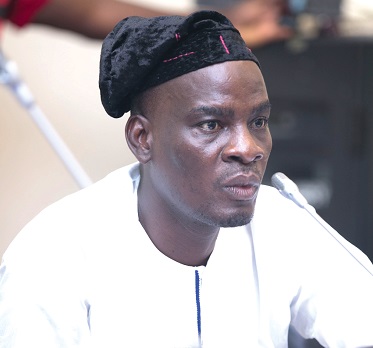
Debt restructuring plan: Minority, TUC express reservation
The Minority in Parliament and the Trades Union Congress (TUC) have raised grave concerns about the government's Domestic Debt Exchange plan which was launched yesterday.
While the Minority said the form and the structure of the plan were counter-productive and would, therefore, not accept it, the TUC indicated that it was concerned about the plan’s potential negative impact on workers' pensions.
Advertisement
Unacceptable plan
At a press conference in Parliament yesterday minutes after the Minister of Finance, Ken Ofori-Atta, had launched the plan, the Minority Leader, Haruna Iddrisu, said the form and the structure of the debt restructuring plan were unacceptable.
He wondered why the debt restructuring was not captured in the 2023 budget and also investors and bondholders not consulted.
He said the new plan would erode investor confidence, with possible negative consequences.
He indicated that the government’s action amounted to "economic imposition".
The debt restructuring plan will allow domestic bondholders to exchange their instruments for new ones.
It involves the swapping of existing domestic bonds with longer-dated bonds that will take between four and 14 years to mature in 2037.
Mr Iddrisu said for the President to publicly say there was not going to be haircut, only to have a U-turn, was deceitful.
According to him, Ghana was the first country in Africa to announce a domestic debt restructuring or domestic debt exchange.
"We have officially defaulted in the repayment of the terms of our existing domestic debt," he added.
Claiming that the Minority had been consistent on the matter, he added: “We cautioned and warned the government about engaging in reckless borrowing and expending it wastefully.”
“How come contours of this exchange programme were not announced in Parliament during the 2023 budget? Will it require legislation? How come that a major policy step of this dimension was not part of his presentation to Parliament?” he asked.
He said while the Minority agreed that the government was still negotiating the potential and inevitable IMF programme, it was necessary that conclusive government plans be brought to the House for approval.
VAT, other rejections
The Minority Leader also served notice that the Minority would not back the removal of the E-Levy threshold.
In addition, he said, it would outrightly reject the budget for the National Cathedral and the 2.5 per cent increase in the Value Added Tax (VAT).
Mismanaged economy
"The Ghanaian economy has been terribly mismanaged in the last five to six years by the Akufo-Addo/Bawumia administration, leading to our request for a new IMF programme to renew confidence and policy credibility on our failing economy, despite haughty initial denials.
"The severely ailing economy has been characterised by unsustainable debt, very high inflation, unprecedented and disastrous depreciation of the cedi, high budget deficits and unprecedented credit rating downgrades," he said.
He said the economic situation was so bad that Ghana was currently ranked side by side with Sri Lanka, considered the worst economy in the world.
Flanked by his fellow members of the Minority, Mr Iddrisu said Ghana's public debt was hovering around the GH¢500 billion mark, with a corresponding debt to GDP ratio of about 105 per cent, having inherited a total public debt of GH¢120 billion in 2017.
He said inflation for October this year was 40.4 per cent, and destined to rise for November.
"The cedi has lost 54 per cent of its value in the last 10 months alone," he said.
Defiance
The Minority expressed worry that the Bank of Ghana (BoG) was heavily financing the budget, in open defiance of existing laws and policy approvals by the House.
"I wish to reiterate my call on the governor to desist from flouting the laws and for him to appear before the House to explain the form and implications of the central bank’s monetary and, not least, its aggressive and defiant fiscal stance," Mr Iddrisu said.
"The suffering we are all going through is a direct consequence of recklessness and mismanagement on the part of this government and its appetite for excessive borrowing," he added.
Contingency vote
He said his group would not accept the outrageous GH¢1.4 billion allocation as contingency vote contained in the 2023 budget statement.
"We note that this allocation is an additional GH¢400 million, compared with last year’s allocation of GH¢93 million. This cannot be happening in a period of austerity.
"We are also opposed to an allocation of GH¢10 million for what has been strangely described as Defence Advisory Services," he said.
The group, he said, also strongly denounced plans to increase the staff strength at the Office of Government Machinery by 1,570.
Impact on workers
Expatiating on its position, the TUC said it had taken special note of the statement by the Minister for Finance that the Debt Exchange Programme was voluntary.
“We are equally concerned about the lack of prior engagement with labour, given that a substantial portion of workers' pension is invested in government bonds,” it said in a statement signed by the Secretary General, Dr Anthony Yaw Baah.
The labour union said it would scrupulously analyse the propriety or otherwise of the participation of pension funds of its members in the programme.
Consequently, the TUC assured workers that, together with its affiliate unions, they would do everything in their power to ensure that members were fully protected and that not even a pesewa of pension funds would be lost in the debt restructuring plan.
It, therefore, appealed to all workers and unions to remain calm as “we work to protect our retirement funds”.




